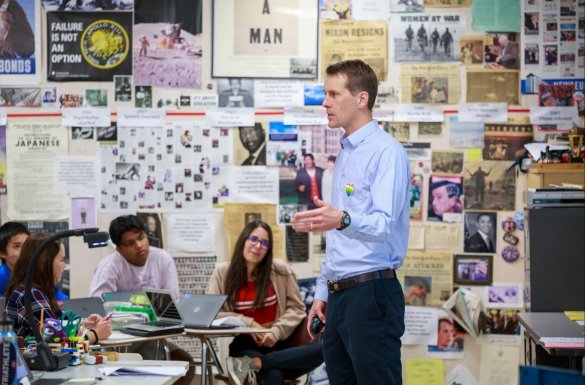In an age of AI, TikTok, and misinformation, preparing savvy consumers of information must be an urgent national priority

In an age of AI, TikTok, and misinformation, preparing savvy consumers of information must be an urgent national priority

In an age of AI, TikTok, and misinformation, preparing savvy consumers of information must be an urgent national priority

In an age of AI, TikTok, and misinformation, preparing savvy consumers of information must be an urgent national priority

Reading Like a Historian lessons and Beyond the Bubble assessments teach students to think critically about the past and build arguments from evidence. The Civic Online Reasoning curriculum teaches students to make thoughtful decisions about what they see on the internet.
DIG’s approach to professional development empowers educators to teach students the historical thinking and digital literacy skills needed to thrive in today's information landscape. From in-person workshops to self-paced online courses, DIG’s professional development menu fits a wide range of needs.
We test our materials in real classrooms and gather feedback from teacher collaborators. Only after subjecting our work to rigorous peer review do we make materials available to educators worldwide.

The New York Times covered our work with Valerie Ziegler, a longtime DIG collaborator, to help students sort fact from fiction online.

Read DIG co-founder Sam Wineburg’s advice in The Wall Street Journal about why making smart decisions online often requires us to practice critical ignoring.

We're pleased to offer free professional development to help you teach students how to evaluate online information effectively.

DIG's Civic Online Reasoning approach “is the only viable solution to a problem designed to exploit the American traditions of inequality and mistrust.”

DIG’s Reading Like a Historian curriculum promotes students’ “ability to read closely, think critically, evaluate sources, corroborate accounts, and back up their claims with evidence from original documents.”

The evaluation of DIG’s Civic Online Reasoning curriculum showed that “test scores of trained students improved significantly more than the scores of students in the control group.”

Award-winning curriculum that teaches students to evaluate online content by strengthening their digital literacy skills

Over 160 lessons that engage students in historical inquiry with primary documents that give voice to the peoples of the past

Over 140 easy-to-use assessments that gauge students’ ability to interpret historical evidence
Our materials are available to download for free. Create a DIG account to gain access to hundreds of lessons and assessments. DIG offers professional learning opportunities that help you use our materials with confidence.

Who leads the Digital Inquiry Group (DIG)?
DIG’s leading researchers are the same team that established and directed the Stanford History Education Group (SHEG) since its founding in 2002, including SHEG founder Sam Wineburg, the Stanford University Margaret Jacks Professor of Education and History, Emeritus, and DIG’s co-founder and executive director Joel Breakstone, who led SHEG for 10 years.
Is DIG still part of Stanford?
To ensure our long-term sustainability, DIG spun out of Stanford in January 2024 and became an independent 501(c)(3) nonprofit. In partnership with Stanford, we brokered a licensing agreement that allows us to distribute the materials we created at the university at no cost.
If DIG’s materials are free, who pays to keep the lights on?
We rely on contributions from individuals and organizations who believe that a healthy democracy requires the cultivation of critical thinkers. Help DIG develop new curriculum, conduct cutting-edge research, and support tens of thousands of teachers and students with evidence-based, classroom-ready resources. If you’d like to support our work, you can do so here.